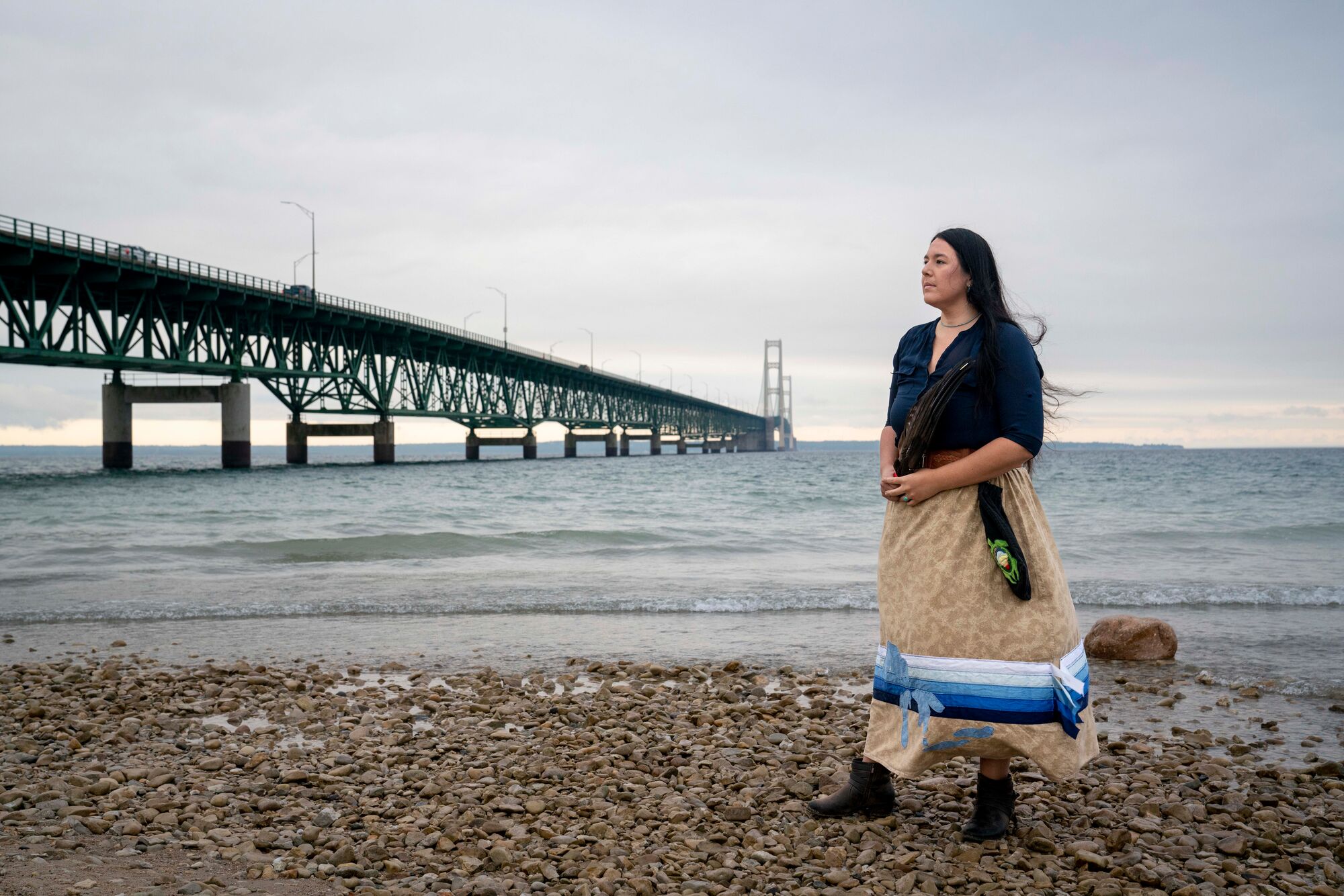Tribes, Greens Take Line 5 Tunnel to Michigan’s Supreme Court
Tribes and environmental orgs are asking the Court to overturn a state agency’s permit
Contacts
Timna Axel, Earthjustice, taxel@earthjustice.org
Shannon Jones, Bay Mills Indian Community, newspaper@baymills.org
Judith Nemes, ELPC, jnemes@elpc.org, (773) 892-7494
Four Michigan Tribes and environmental advocates yesterday asked the state Supreme Court to consider overturning a lower court decision that upheld the Michigan Public Service Commission’s permit for the Line 5 tunnel project. In December 2023, Commissioners voted to approve Enbridge’s plans to build a massive and unprecedented tunnel project to house the Canadian fossil fuel pipeline, facilitating the flow of oil underneath the Straits of Mackinac in the Great Lakes for another 99 years. The Tribes argue that decision violates the words and purpose of the Michigan Constitution and the Michigan Environmental Protection Act.
“Even if the public has been misled into believing this tunnel project is safe, the truth is that it is not,” said President Whitney Gravelle of the Bay Mills Indian Community. “Enbridge’s track record speaks for itself — catastrophic spills, environmental destruction, and a complete disregard for tribal sovereignty and the rights of future generations. The Straits of Mackinac are not just a waterway; they are the heart of creation for Anishinaabe people and a vital source of life for all who depend on the Great Lakes. An oil spill here would be devastating, not only to our way of life but to the entire region. This fight is about more than just one pipeline — it’s about protecting our waters, our treaties, and our future. We cannot allow corporate interests to dictate the fate of the Great Lakes for another century.”
Enbridge’s proposal to run a hazardous liquids pipeline through a confined underground tunnel has never been attempted anywhere else in the world, and experts warn it could cause an explosion in the Straits. Enbridge is responsible for the million-gallon oil spill into the Kalamazoo River in 2010, and more recently for the largest oil spill recorded in Wisconsin history. Tribes and environmental groups challenged the Commission’s approval for the tunnel project before the Michigan Court of Appeals, which upheld the permit in February.
“Michigan’s constitution and laws require agencies to protect the state’s natural resources from pollution and destruction,” said Earthjustice Senior Associate Adam Ratchenski. “The Commission violated that requirement when it approved the fossil fuel tunnel project without properly considering the risk of oil spills.”
In addition to the Commission’s permit, Enbridge still needs a federal permit and a permit from Michigan’s Department of Environment, Great Lakes, and Energy to proceed. Two weeks ago, several Michigan Tribes withdrew their cooperation from a review process after learning that the U.S. Army Corps of Engineers is likely to fast-track federal approval at the direction of President Trump.
“The federal government is bending over backwards to fast track required permits in support of a Canadian company’s fossil fuel project that provides minimal benefit to domestic energy production,” said Managing Attorney David Gover of the Native American Rights Fund. “But today, it’s up to Michigan’s courts and elected leadership to be responsible public stewards for clean water, for Tribal rights, and for every community along the Great Lakes.”
The Michigan Climate Action Network (MiCAN) and Environmental Law & Policy Center (ELPC) are also asking the Supreme Court to accept this appeal. Along with the Tribal Groups, they contend that the Court of Appeals’ decision does not follow the Michigan Environmental Protection Act’s requirement of rigorous, independent determinations of all likely environmental effects of Enbridge’s proposed tunnel project.
“We are asking the Michigan Supreme Court to accept this appeal so that it can provide much needed guidance on the proper interpretation and application of Michigan’s Environmental Protection Act,” said David Scott, Senior Attorney at ELPC, which is acting as pro bono attorneys. “We hope that the Supreme Court will review this case because it involves important environmental, health, and welfare issues for the people of Michigan, and important legal issues for Michigan courts to properly and consistently fulfill their responsibility under the Environmental Protection Act.”
“The Michigan Public Service Commission is out of step with the public and other state policymakers who have already determined that the best option is to shut down Line 5,” said Dr. Denise Keele, MiCAN’s Executive Director. “Constructing a tunnel to transport Enbridge’s crude oil is not only dangerous but undermines the State of Michigan’s goal of 100% clean energy by 2040 by investing in unnecessary fossil fuel infrastructure that will continue to contribute to climate change too far into the future.”
In a separate brief, For Love of Water (FLOW) is challenging the Court of Appeals’ decision for violating public trust obligations under common law.
“The state of Michigan and its agencies have a mandatory legal obligation to protect and preserve these waters for the public,” said Liz Kirkwood, executive director of FLOW. “We expect the Court to make sure the law is followed.”

Additional Resources
About Earthjustice
Earthjustice is the premier nonprofit environmental law organization. We wield the power of law and the strength of partnership to protect people's health, to preserve magnificent places and wildlife, to advance clean energy, and to combat climate change. We are here because the earth needs a good lawyer.